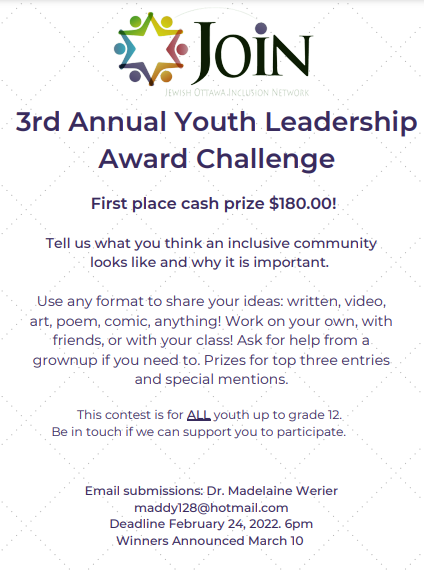
In February, we recognize Jewish Disability Awareness, Acceptance and Inclusion Month (JDAIM) — a unified effort among Jewish organizations and communities worldwide to raise awareness and foster inclusion of people with disabilities and those who love them.
In Ottawa, the theme for 2022 is “ableism,” which Madelaine Werier, co-founder of the Jewish Ottawa Inclusion Network (JOIN) and autism mom, said the community is ready for.
“Looking at inclusion is one thing, but tackling ableism is another,” said Werier. “Understanding what ableism is and how each of us does have some bias will help us grow into the inclusive community we want to be. If we don’t address those biases, we can’t grow and evolve.”
Ableism is the discrimination of and social prejudice against people with disabilities based on the belief that typical abilities are superior. At its heart, ableism is rooted in the assumption that disabled people require ‘fixing’ and defines people by their disability.
“As a society, we put boxes around what we think is ‘normal’ and decide that things outside those boxes are not normal,” said Werier. “We’ve created this othering that can happen with people inside and outside the box.”
Werier tries to make her examples of ableism relatable because it can be a difficult concept to understand.
For example, when people create any new physical space with unnecessary barriers. Another is asking someone ‘what happened?’ when you meet someone with an apparent physical disability as your first question to them.
Other examples Werier offers include assuming people with disabilities can be your ‘mitzvah’ project, or seeing them simply as an ‘inspiration.’
“I catch myself in some of these biases all the time. I think if someone says ‘I’m not ableist,’ that’s not truthful. We’ve all been brought up in these ableist ideas. If I’m honest with myself, I catch it all the time.”
While it can be challenging to recognize personal tendencies that may veer toward ableism, Weir said the effort is worthwhile.
“We don’t have to be perfect,” she said. “You may not see the impact but that doesn’t mean it’s not there.”
Werier also points out that since one in five Canadians has a disability, everyone should be making an effort to be more inclusive in our language and thinking.
“If you’re not seeing it, why is that? Are people with disabilities not included in the areas of the community that you are included in?”
Ultimately, Werier said it all starts with empathy and a will to challenge yourself.
“Put yourself in someone’s shoes who has a different background than you,” she said. “Just think of one way you’re biased against people with different abilities.”
As part of an effort to spark greater understanding and awareness, JOIN is running the 2022 Youth Leadership Contest, which comes with a $180 cash prize to youth up to Grade 12 for showcasing what an inclusive community looks like.

Submissions can be emailed to [email protected].
A starting tip from the E-Bulletin:
An easy place to start addressing ableism is to consider the words you use.
Do you say, "That’s crazy!" when someone tells a wild story? "Crazy" could be considered an ableist word.
What words could you use instead? Try "wild" or "out there" or even just say "no way!" instead of "crazy."
